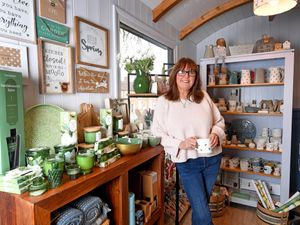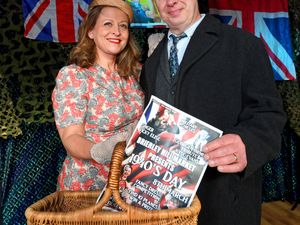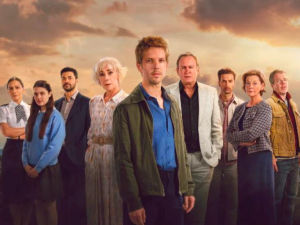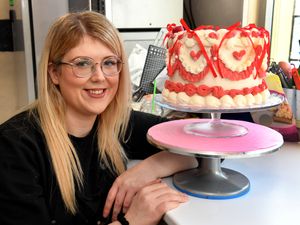What's it like to be blind? We take to the streets of Wolverhampton to find out
The sounds of footsteps, shoppers rushing by and buskers singing in the street – I could hear it all but I couldn't see a thing.
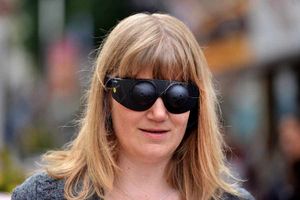
I had to put all my faith in 17-month-old Labrador retriever cross and trainee guide dog Toffee, who was by my side as I walked blindfolded around Wolverhampton City Centre,
Being plunged into darkness and having to suddenly negotiate the shopping area felt very alien to me and I quickly became disorientated as we began our stroll from Specsavers in the Wulfrun Shopping Centre.
But I needed to stay relaxed to ensure Toffee could do his job with confidence and I soon found I was being nudged away from any obstacles, both moving and stationary.
When the route was clear, he would speed up which made me feel confident that there was nothing in our way as we walked.
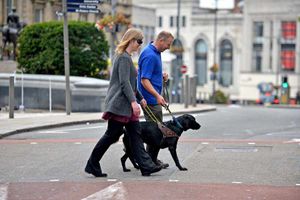
He would stop at any steps, kerbs or crossings waiting for my instructions before proceeding forward, responding to many different commands.
Crossing a road with two-way traffic meant listening for the bleeps which signalled it was safe to cross.
When there was no pelican crossing, I had to listen for the sound of traffic to decide if we were okay to carry on and I could give him the command 'forward'.
Guide Dogs can do many things but they do not know when to cross a road – they are trained to wait for a command before crossing but will intervene if their instincts tell them it's unsafe to do so.
I had been nervous knowing that the city centre, especially Dudley Street, is normally heaving with people at that time of day.
Once I got used to him being by my side, I found it easier than I was expecting to trust Toffee to make sure the path ahead was clear. But it was still difficult because I realised we were moving out of the way of people and I kept fearing we would bump into someone.
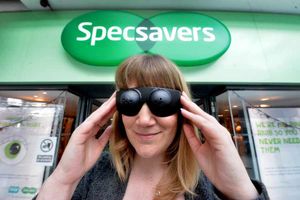
However we successfully dodged oncoming shoppers, lampposts and A-boards on the street thanks to the help of my canine companion. Even though I know the city centre pretty well when I finished the walk, accompanied by Guide Dogs Mobility Instructor Alan Collier, from Shrewsbury, I realised I had lost all sense of direction as we ended up nowhere near where I thought we were going to be.
I had tried the walk with a full blindfold and with simulation glasses where I had a bit of sight. Many people will not have complete darkness and can experience flashes of light and eye pain.
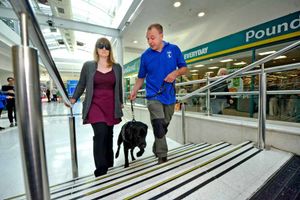
For me the experience lasted 40 minutes and I was lucky that I could remove the blindfold and see again. I will never truly be able to say that I know what it's like to be blind as I didn't experience everyday rituals such as getting ready to go out, travelling to the city centre and back home again, or any other task we wouldn't think twice about doing.
The streets were relatively quiet – one day later and it would have been market day and I can't imagine having to negotiate the stalls as well as the shoppers.
But it has given me a greater understanding of the challenges going about daily life poses. I also now have a greater appreciation for the work that the Guide Dogs charity does and what Toffee and other dogs like him do to help their human companions.
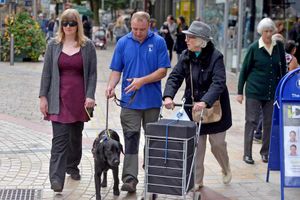
The charity, which relies purely on charitable donations, breeds all its own dogs. From an early age they are taken out and about by a puppy walker to get used to different sights, smells and sounds before beginning training to become a guide dog at around the age of one.
They are specifically matched to their human partner depending on a number of factors such as their size, speed and character.
Andrea Jones, from Guide Dogs, says: "As well as being a mobility aid and a pair of eyes, a guide dog is a partner. There is a special bond between owner and dog, it's a real partnership."
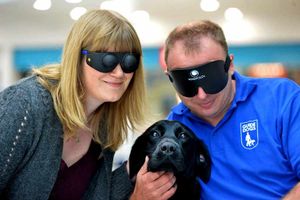
Having been due an eye test for several years, my blindfold walk also prompted me to have one and as suspected I needed a stronger prescription. Hardip Bahia, optometrist at Specsavers Wolverhampton, says it's important to have regular examinations: "An eye test is a holistic health test and can help detect not only vision issues but also high blood pressure, high cholesterol, tumours, strokes, diabetes, autoimmune disorders and even multiple sclerosis. It is important to regularly attend every two years to ensure any sight issues or health conditions are detected early.
"At the very first sign of symptoms, such as blurred vision, eye pain, flashes of light or sudden onset of floaters in your vision, you should see your optometrist. If detected early enough, depending on the cause, there are treatments that can correct, stop, or at least, slow down the loss of vision."
My experience has certainly taught me not to take my sight for granted – something that many of us are probably guilty of doing each day.
I've also become more aware of the work of guide dogs. So if you see someone with a guide dog please be respectful to both dog and owner, especially if you have your own dog by your side. Appreciate they are working dogs and are trained to do a job because it's a pretty amazing one.

